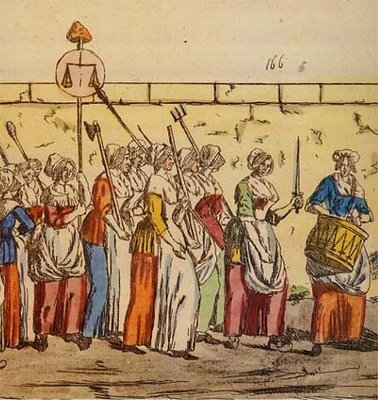|
In 1788, when he first presented his ‘What is the third estate’, the Abbé Sieyès declared that : “inequalities of sex, size, age, colour, etc. do not in any way denature civic equality” (Sieyes, Political Writings, 155). These, he said, like inequality of property, are incidental differences and cannot affect civic rights. But Sieyès, it turns out, was not so committed to equality, however, that he wanted to extend rights active citizenship to women. In his Préliminaire de la Constitution, written on 22 July 1789, he writes: All of a country’s inhabitants must enjoy the rights of passive citizenship: all have the right to the protection of their person, their property, their freedom, etc. But not all have the right to take an active part in the formation of public powers, all are not active citizens. Women, at least in the current state of things, children, foreigners, those that contribute nothing to supporting the public establishment must not actively influence the republic. Women did not remain silent. Then journal editor, Louise Keralio, responded four weeks later: We don’t understand what [Sieyès] means when he says that not all citizens can take an active part in the formation of the active powers of the government, that women and children have no active influence on the polity. Certainly, women and children are not employed. But is this the only way of actively influencing the polity? The discourses, the sentiments, the principles engraved on the souls of children from their earliest youth, which it is women’s lot to take care of, the influence which they transmit, in society, among their servants, their retainers, are these indifferent to the fatherland?... Oh! At such a time, let us avoid reducing anyone, no matter who they are, to a humiliating uselessness. Keralio is clearly angered by Sieyès’ formulation: in what sense are women not active, she asks? What is there of passivity in the work they conduct from the home, nurturing republican values and giving birth to new citizens? Like Manon Roland, she was a reader of Rousseau, and was convinced that there was a place for women in Republic that was central to the flourishing of the nation, even though that place was in the home rather than in the assembly. So she does not disagree with Sieyes that women should stay home, rather than participate in debates taking place in public fora, but she believes that the home is just as important a place for the making and cultivating of the republic than the assembly. Olympe de Gouges’s famous response was printed at the same time as Louis XVI ratified the constitution drafted by Sieyès, in September 1791. Man,” she asks “are you capable of being fair? A woman is asking: at least you will allow her that right. Tell me? What gave you the sovereign right to oppress my sex? Your strength? Your talents? Observe the creator in his wisdom, examine nature in all its grandeur for you seem to wish to get closer to it, and give me, if you dare, a pattern for this tyrannical power. On behalf of women in general, she expresses her outrage that women have been exclude from active participation in the city, with no argument, other than that they belonged to the class of those who ‘contribute nothing to supporting the public establishment’. Women, she knows, contributed both physically – by fetching the royal family from Versailles – intellectually – by debating new ideas in circles and political societies, publishing pamphlets proposing reforms (such as her proposal for a voluntary tax) – and materially – by giving money and jewels to relieve poverty and help pay off the national debt. Unlike Louise Keralio, she does not even feel that she needs to appeal to women’s contribution to the republic quamothers. Yet, she does not hesitate to remind the public that women are also mothers: Mothers, daughters, sisters, representatives of the Nation, all demand to be constituted into a national assembly. Given that ignorance, disregard or the disdain of the rights of woman are the only causes of public misfortune and the corruption of governments [they] have decided to make known in a solemn declaration the natural, inalienable and sacred rights of woman; this declaration, constantly in the thoughts of all members of society, will ceaselessly remind them of their rights and responsibilities, allowing the political acts of women, and those of men, to be compared in all respects to the aims of political institutions, which will become increasingly respected, so that the demands of female citizens, henceforth based on simple and incontestable principles, will always seek to maintain the constitution, good morals and the happiness of all.
0 Comments
|
About
This is where I live blog about my new book project, an intellectual biography of three French Revolutionary women philosophers. Categories
All
Archives
November 2022
|

 RSS Feed
RSS Feed